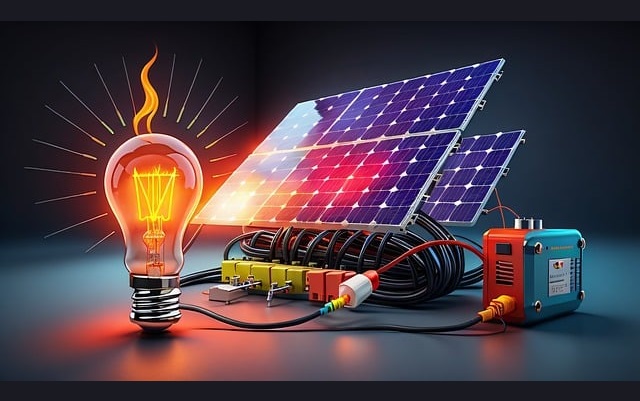

The integration of solar energy into self-storage units represents a significant leap in the evolution of renewable energy use in commercial and personal spaces.
This introduction explores the burgeoning trend of incorporating solar panels into storage units, a move that not only enhances energy efficiency but also aligns with global environmental sustainability efforts.
The concept of solar energy storage goes beyond merely generating power; it involves the strategic use of solar panels to store and utilize energy in a more self-sufficient, eco-friendly manner.
This approach not only reduces reliance on traditional power grids but also offers a greener and often more cost-effective alternative to energy consumption.
As we delve into this topic, we’ll explore the various benefits, challenges, and considerations involved in adopting solar energy solutions for storage units, highlighting how this technology is reshaping the future of storage and energy consumption in a rapidly evolving world.
Contents
Incorporating solar panels into storage units, like those offered by iStorage, brings a multitude of benefits, both environmentally and economically.
Solar panels significantly reduce electricity costs by harnessing natural energy from the sun, a boon for both storage facility operators and customers.
This renewable energy source also lessens the environmental impact of traditional electricity generation, contributing to a greener and more sustainable future.
Furthermore, solar-powered storage units often have the added advantage of being more reliable during power outages, ensuring continuous protection and access to stored items.
For businesses, this technology not only cuts down on operational costs but also aligns with corporate social responsibility goals by reducing carbon footprints.
Selecting the appropriate solar panel setup for a storage unit is crucial for maximizing efficiency and sustainability.
Here are key factors to consider:
These factors play a significant role in the effectiveness of your solar energy system. In addition, it’s important to stay informed about the latest advancements and options in solar technology.
For detailed information on solar energy systems, resources such as the U.S. Department of Energy offer comprehensive guidance.
By carefully selecting the right solar setup, storage unit owners can ensure they are making the most out of this renewable energy source, both in terms of environmental impact and economic return.
Installing solar panels on storage units requires a thoughtful approach to ensure safety and efficiency.
Start by consulting with a professional solar installer who can assess the structural integrity of the storage unit and determine the most suitable type of solar panel system.
It’s crucial to adhere to local building codes and regulations, which may vary depending on the location.
During installation, positioning the panels at the optimal angle towards the sun is essential for maximizing energy absorption. This often means considering the geographic location and the typical weather patterns of the area.
Using quality mounting equipment is equally important to secure the panels firmly and prevent any potential damage from environmental factors like strong winds or heavy snow.
The wiring process should follow electrical safety standards, with proper grounding and protection against power surges.
Throughout the installation, regular checks and balances should be maintained to ensure that every component functions correctly and safely.
Proper installation not only enhances the performance of the solar panels but also extends their lifespan, making it a vital step in transitioning to solar-powered storage units.
Maintaining and caring for solar panels is essential to ensure their efficiency and longevity.
Here are several important steps to follow:
Ensuring that the panels are clean is particularly crucial, as even a thin layer of dust can significantly reduce their efficiency.
Conducting inspections helps in identifying potential problems like cracks or loose connections, which can impede performance or even pose safety hazards.
Monitoring systems can often be automated and provide real-time data on energy production, alerting to any drops in efficiency.
For comprehensive guidelines on solar panel maintenance, the National Renewable Energy Laboratory offers a wealth of information and resources.
By adhering to these maintenance practices, storage unit owners can maximize the return on their solar energy investment, ensuring the panels continue to provide a reliable and sustainable source of power.
When considering the installation of solar panels on storage units, conducting a thorough cost-benefit analysis is essential. Initially, the investment in solar panels might seem substantial; however, the long-term savings on electricity costs can be significant.
Solar panels typically have a lifespan of 20-25 years, meaning they can provide sustainable energy for decades.
Additionally, the use of solar energy can potentially increase the value of the storage property. It’s also important to consider any available tax incentives or rebates, which can substantially reduce the upfront costs.
When it comes to expenses like income taxes, transitioning to solar energy can sometimes offer tax benefits, depending on local regulations and policies.
Weighing these financial considerations against the environmental benefits of reduced carbon emissions and renewable energy use is crucial.
Ultimately, while the initial expense may be high, the long-term benefits of solar storage often present a compelling financial argument for making the switch to solar energy.
In wrapping up, the transition to solar-powered storage units marks a significant step towards sustainable and efficient energy use.
The long-term benefits, both environmental and financial, highlight solar energy as a viable and forward-thinking choice.
As technology advances and becomes more accessible, it’s likely that more storage facilities will adopt solar solutions, contributing to a greener future.
Face masks are the easiest means of having a beautiful looking skin. They make your…
No matter the industry you work in, workplace accidents can occur. Of course, some professions…
Paying medical bills isn’t easy. Healthcare expenses are out of control in the United States,…
There is no doubt that having a good communication with a client is instrumental for…
A t-shirt is one of those apparels that people like wearing. Usually, it is light…
Buying a home is a dream for many, and getting a good home loan interest…